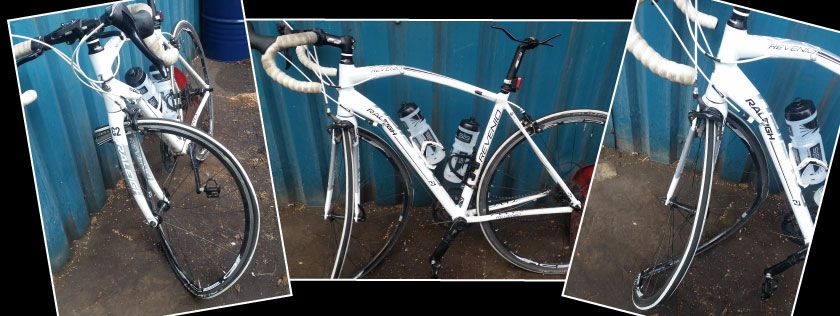Cyclist secures £150,000 in damages after car crash thanks to Scottish Cycling referral to Digby Brown

A cyclist who suffered a fractured spine and 11 broken ribs after being hit by a car has secured £150,000 in damages.
Stuart Hyland, 52, was cycling in Lanarkshire when he was struck by a car that pulled out in front of him at a junction.
He suffered multiple physical injuries as well as harmful ‘hidden injuries’ that left him unable to work for five months and permanently impacted his quality of life.
But after making a cycling injury claim with Digby Brown he received rightful compensation to recover financial losses – as well as the loss of his beloved bicycle.
Mr Hyland from Livingston, West Lothian said:
“Getting the compensation is a double-edged sword; on one hand, its recognition of the pain and suffering already endured, and the lasting effects of the injuries received – but it’s also a shame that this compensation has been needed.
“A severe crash has multiple victims; it affects you physically and mentally and it affects the lives of your family, friends and at the workplace. When driving, getting in to the habit of glance – look – look; this extra look may help save someone’s life. Also, if in doubt, don’t go. Vehicles have brakes as well as throttles – and again, that momentary hesitation could save someone’s life.”
Where did the traffic accident happen?
The accident occurred on 10 August 2018 at a T-junction near Shotts in North Lanarkshire where the B7066 meets the B7057.
Mr Hyland was cycling eastbound on the main carriageway when a black Mondeo pulled out in front of him.
He was thrown from his bike and sustained 11 broken ribs, a dislocated left elbow, broken left ulna, punctured lung, internal bleeding, a fractured left knee and four fractured vertebrae (L2 to L5).
The injuries required multiple surgical treatments – that left permanent scarring – as well as months of gruelling physiotherapy.
As a result Mr Hyland has been left with constant pain and limitations as he can no longer kneel, squat or run and has been left with a permanent limp.
Additionally, he was left with tinnitus which affects his sleep which, in turn, contributed to feelings of depression.
Speaking of the physical trauma, Mr Hyland recalled:
“The recovery was a very long and hard process where I had to rely on my wife for help with simple things.
“I couldn’t move my knee for 4 months, and my left arm was left unusable for a significant period.
“I struggled to dress myself, couldn’t walk or climb stairs so I was unable to go for a shower and I needed help with the toilet. So many things that we take for granted in day-to-day life were impossible – I couldn’t even hold a mug of tea.
“Having to be so dependent on my wife was immensely frustrating. I had gone from a fit and independent adult to having the abilities of a toddler. This had a negative psychological impact and depression became a factor in my recovery.
“Physiotherapy helped tremendously – although it was very difficult and led to some dark times physically and mentally. However it also provided recovery milestones that eventually led to being able to take a few steps unaided.
“It helped in dark moments to be able to look back at where I had been to where I was and see the difference.
“I still find somethings frustrating, even simple tasks like putting on shoes can be a major obstacle some days."
How were Digby Brown contacted?
Mr Hyland was put directly in touch with Digby Brown thanks to his British Cycling membership.
The national cycling body – which operates as Scottish Cycling north of the border – provides members with free legal support in the event of an accident so cyclists know that support is taken care of should the worst happen.
Theresa Mutapi, Associate at Digby Brown’s Edinburgh office, investigated the circumstances of the crash for Mr Hyland.
But more importantly she also investigated the aftermath of the crash to fully understand how his injuries would affect his future.
After gathering police files, medical reports, witness statements and other forms of vital evidence she built a solid case to give Mr Hyland the best possible chance to recover fair compensation.
Theresa told Admiral – the insurance company for the car driver – that the driver was to blame for the crash. She argued Mr Hyland had right of way because he was on the main carriageway and the driver should not have pulled out from junction because it was not safe to do so.
Admiral accepted liability for the accident and, after Theresa was able to also provide evidence supporting the value of Mr Hyland’s claim, the legal action was settled out-of-court for the six-figure sum.
Mr Hyland added:
“Theresa has been fantastic throughout the whole process, and without her help and expert guidance it is likely that I would have been quickly overwhelmed by the process.
“She has been very quick to respond to questions – even silly ones – and has been open and honest throughout the length of the case.
“The compensation means I am able to seek treatment for the tinnitus through a private clinic without having go on the extensive NHS waiting list. It also means in later years, when complications such as arthritis start to appear, I will have the funds to seek treatment or make changes to my environment to make my life easier.”
Theresa added:
“Cases like Mr Hyland’s are sadly all-too frequent but I am glad he has made a strong recovery and we were able to help.
“I’d also like to pay tribute to Mr Hyland in speaking about what happened to him as I know this will help towards educating road users everywhere on the importance of looking out for each other on the roads.”